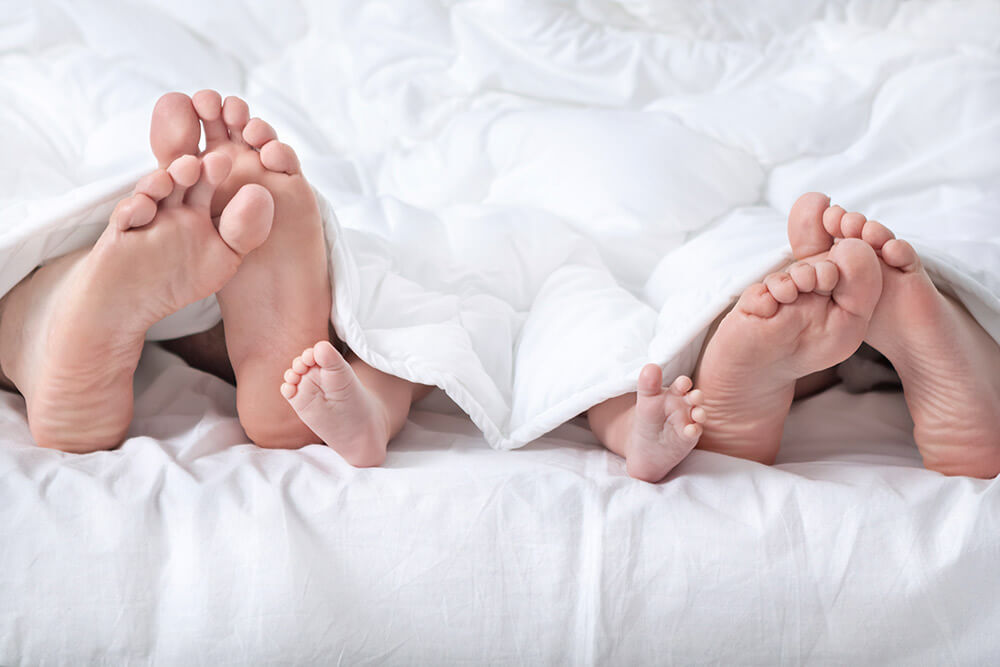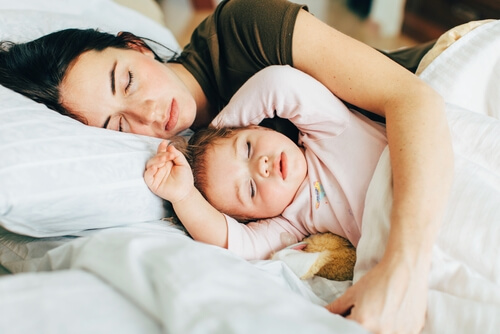Should We Let Babies Sleep in Their Parents' Bed?

Letting babies sleep in their parents’ bed generates a lot of controversy. In fact, it’s difficult to find professionals who agree on what the best sleeping arrangement is.
Sometimes the benefits of sharing a bed don’t always justify their costs for parents, who have to sacrifice aspects such as privacy and, above all, rest.
If you’re hesitant about what the sleeping arrangement should be, we recommend that you come to an agreement with your partner.
If you choose for your baby to sleep with you, you always have to make sure to satisfy the needs of the child and not only yours.
Should We Let babies Sleep in the Parents’ Bed?
When babies grow up, sleeping in their parents’ bed can become a difficult habit to break. In fact, many babies begin to sleep in their own bed for a few years and, after a time in which they were allowed to sleep in their parents’ bed, they realize that they like it more.
Sharing a bed can be positive for mothers who are breastfeeding, since it won’t be necessary to get out of bed to feed the baby.
Consequently, the transition between being awake and asleep will be much less noticeable. There is also nothing as comforting as a sleeping baby lying on the breast of his or her mother.

Benefits of Letting Babies Sleep in Their Parents’ Bed
These are the main benefits of letting babies sleep in their parents’ beds:
1. Synchronizes Sleep Times
Mothers are deeply connected to their babies, often to the point that sleeping together can cause sleep cycles to synchronize.
2. Facilitates Breastfeeding
Sharing a bed with the baby is very comfortable for moms, mainly because they don’t have to get up at night to breastfeed. In addition, it’s beneficial to maintain milk production, suppress ovulation and help the child gain weight.
“Making the decision to have a baby is important. It’s deciding to have your heart wandering out of your body forever.”–Elizabeth Stone–
3. Improves Sleep
Babies who sleep with their mothers and drink breast milk spend less time in the deeper stages of sleep. Likewise, it is considered that light sleep is physiologically more appropriate and safer for babies.
The mother’s movements and the smells of the nearby breast milk contribute to the baby remaining in a lighter sleep and for longer periods of time.
Problems of Letting Babies Sleep in Their Parents’ Bed
Next, we’ll explain the disadvantages of letting babies sleep in their parents’ beds:
1. Moments of Privacy
After childbirth, resuming sexual relations can be difficult for some couples. If parents decide to share a bed with the baby, this can affect their privacy. This situation, whether the parents chose it or not, represents an additional obstacle to the sexual development of the parents.
2. Sudden Death
The main risk of sleeping with a baby in the same bed is suffocation, either by the parents, involuntarily while they sleep, or by an element of the bed, such as pillows or sheets.
On the other hand, there is also the danger of falling out of bed or, among other situations, hyperthermia if the baby is too covered.
A British study has shown that babies under 3 months who sleep in their parents’ bed are 5 times more likely to die of Sudden Infant Death Syndrome.

3. Affects Autonomy
For children’s autonomy and good psycho-emotional development, it’s best to learn to sleep alone, in their own bed, since birth. Otherwise, it will be difficult to separate them from their parents in the long term.
Finally, remember that this is ultimately the couple’s decision. Sharing the bed has certain advantages, as it creates a close bond between the baby and the parents, as well as facilitates feeding, among other things.
However, as you’ve seen, this practice isn’t entirely safe and does have its disadvantages.
All cited sources were thoroughly reviewed by our team to ensure their quality, reliability, currency, and validity. The bibliography of this article was considered reliable and of academic or scientific accuracy.
- Landen, P., Ballesi, M., Uchitel, L., & Freire, M. (2008). Beneficios del masaje terapéutico en bebes prematuros dados de alta de la UCIN. Revista Iberoamericana de Psicomotricidad y Tecnicas Corporales
- Montserrat Galaa, A. M., & Fortes del Valleb, M. A. (2013). Aprender a dormir. Pediatría de Atención Primaria. https://doi.org/10.4321/S1139-76322013000500004
- Landa Rivera, L., Díaz-Gómez, M., Gómez Papi, A., Paricio Talayero, J. M., Pallás Alonso, C., Hernández Aguilar, M. T., … & Lasarte Velillas, J. J. (2012). El colecho favorece la práctica de la lactancia materna y no aumenta el riesgo de muerte súbita del lactante: Dormir con los padres. Pediatría Atención Primaria, 14(53), 53-60. http://scielo.isciii.es/pdf/pap/v14n53/revision1.pdf
- Horsley T, Clifford T, Barrowman N, Bennett S, Yasdi F, Sampson M, et al. (2007). Benefits and harms associated with the practice of bed sharing. Arch Pediatr Ado- lesc Med. 2007;161:237-45.
- Martin Martin, R., Sanchez Bayle, M., & Teruel de Francisco, M. C. (2017). El colecho en nuestro medio: estudio de casos y controles en las consultas pediátricas de Atención Primaria. Pediatría Atención Primaria, 19(73), 15-21. http://scielo.isciii.es/scielo.php?script=sci_arttext&pid=S1139-76322017000100003
- Rodríguez Villar, V., Moreno, M., & Navío, C. PRACTICANDO EL COLECHO. ASESORAMIENTO DE LA MATRONA. http://www.trances.es/papers/TCS%2005_3_6.pdf
- Ball, H. L., Hooker, E., & Kelly, P. J. (2000). Parent–infant co‐sleeping: fathers’ roles and perspectives. Infant and Child Development: An International Journal of Research and Practice, 9(2), 67-74. https://onlinelibrary.wiley.com/doi/abs/10.1002/1522-7219(200006)9:2%3C67::AID-ICD209%3E3.0.CO;2-7
This text is provided for informational purposes only and does not replace consultation with a professional. If in doubt, consult your specialist.








